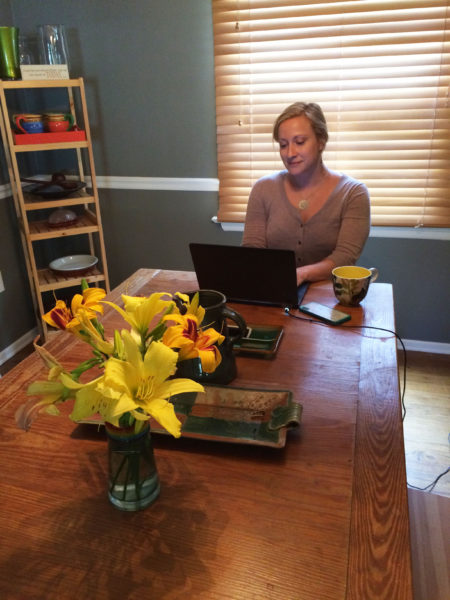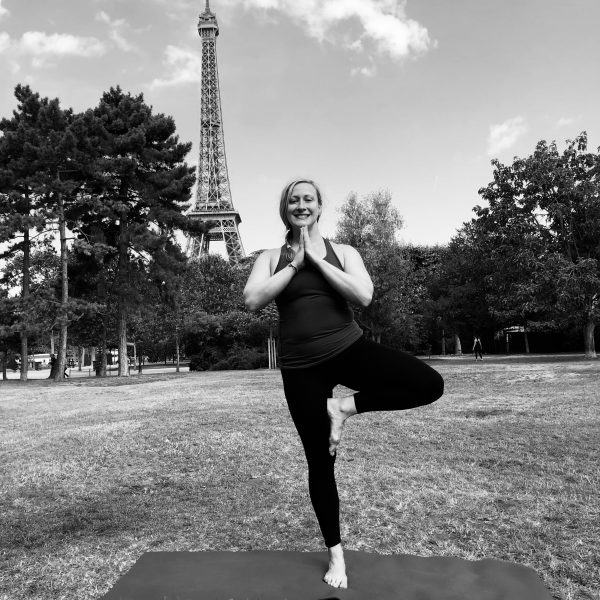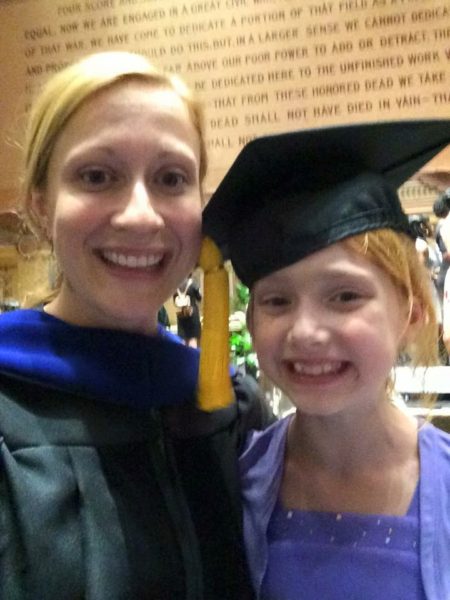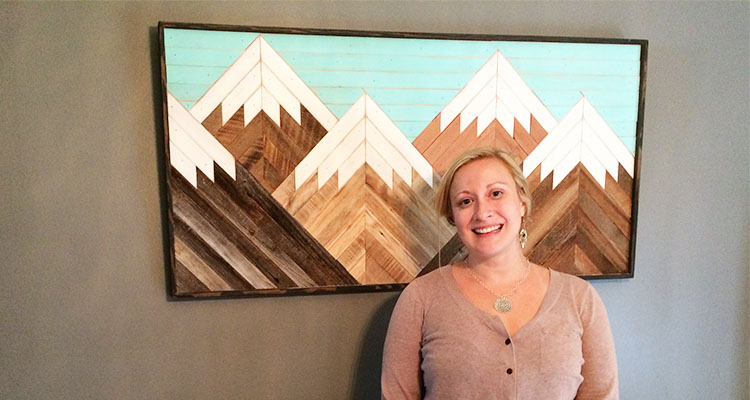Katy Wack started to love astronomy and exploration on a grand scale when her dad took her outside in their Springdale yard at night to look at the stars through a telescope and to witness events like meteor showers and Halley’s Comet.
“I loved Wheeling,” she said from her current home in Pittsburgh. “My whole childhood until sixth grade was Springdale. Riding bikes, and my grandparents lived in that neighborhood, and all of my friends did. We’d only come inside for meals and to shock each other on our shag carpets.”
She began to love biology and exploration on a microscopic scale after a move to a house across the street from Triadelphia Middle School. Kathy Banco, a neighbor two doors up the street, taught anatomy and physiology at Wheeling Park High School.

“She was the smartest woman, and knew anatomy and physiology inside and out. Tough, but nice,” Wack says. “Taking her class, I was just like, ‘Wow! There are all these things working together in your body, and it’s just amazing. I think that’s where the fascination began. There’s so much complexity. We’re not just giant blobs of cells.”
Another neighbor and Wheeling Park High School teacher, Bob Turbanic, got her interested in photography. Three college degrees and two decades after graduating from Park, she’s still fascinated by complexity — and photography — “at every level of magnification.” Wack is vice president of development for Western Oncolytics Ltd., a Pittsburgh startup developing cancer-killing viruses.
Steve Thorne, formerly a professor of immunology at the University of Pittsburgh, started the company with seed money from investors. Pfizer was interested in buying the company and instead formed a collaboration, providing extra funding.
“That’s been a good thing and a challenging thing,” Wack says. “With the startup group, you can move fast, take risks, make decisions quickly. With a big company that probably has very different long-term and short-term goals, it takes a little longer to do things, but at the same time we can learn a lot from them.”
Before this job, she hadn’t done any work in immunology or viruses, “except for using viruses to make cells fluorescent.” She set up the lab, and now she directs scientists and spends a lot of time on the phone talking to collaborators at Pfizer, many of whom are in Germany, where Western Oncolytics is developing its first product.
The idea is to genetically engineer a virus — taking pieces out, putting other pieces in to make it tumor-selective, then “harnessing the immune system to come in and kill the rest of the cancer,” she explains. “You can engineer a really amazing virus in theory, but if you can’t make it in very large quantities and prove that you do have what you say you have and nothing else in there that you don’t, that’s a whole different thing. It’s not like manufacturing a drug that’s just a molecule.”
The company is working with the vaccinia virus, used in the smallpox vaccine. It’s large for a virus, with an envelope a bit like a cell membrane around it. “Basically they can go everywhere in the body, but the virus won’t do anything except in the tumor,” she explains. “It will lyse those tumor cells, burst them open” and present them to the immune system. She speaks for the virus in a deeper, commanding voice: “OK, rest of the immune system, if you see anything like this, attack it.”
Essentially, it is “reprogramming the environment of the tumor so you can just let your immune system do the job it does anyway. I think as always, the less you mess with nature, the better,” she says. “Unlike chemo and radiation, which kills everything, we’re trying to selectively kill the tumor — FIND it, that’s another really big thing — and let your immune system run its natural course.” That probably happens often “and we don’t even know it,” she says.
How did it even occur to someone that viruses could fight cancer? When smallpox vaccines were first being tested, she said, “They noticed tumors were shrinking in people who had cancer and were also infected with some of these viruses.” But it wasn’t until the 1990s that scientists began to engineer viruses to kill cancer or deliver genes. The hope is eventually that it could be delivered by injection to surface tumors like melanoma, or delivered intravenously to internal tumors.
Oncolytics is a hot research pursuit. Big pharmaceutical companies like Pfizer, Merck, Bristol Myers Squibb, Amgen and Johnson & Johnson are all collaborating with startups or buying them outright. It’s probably a year before Western Oncolytics will have a product they can test in clinical trials.
When she worked with rats while pursuing her Ph.D., Wack was troubled by the ethics of using animals. She thanked each rat for its contribution to science.
In this work, there’s something else Wack worries about.
“We can make an amazing therapy, but who’s going to be able to afford it? We can’t tackle all the problems. I’m just very aware that if we do make this, how are we going to get it out there for people who need it?” She said. Many people will sign up for clinical trials, “but if it works well for them, are they going to be able to continue to afford it? Not necessarily.”
On her morning drive to work, Wack listens to the podcast “Terrible, Thanks for Asking,” hosted by her sister’s friend Nora McInerny, whose husband died of a brain tumor. “People come on and tell their stories. It’s a lot of tragedy, but she’s hilarious and real and sincere,” Wack says. “She uncovers the beauty in these tragic stories. I laugh and cry the whole time.”
A recent episode told of a longtime immigrant who has temporary insurance that covers some life-threatening conditions but not others. Unable to afford experimental therapy, she was essentially “OK, you have a few months and that’s that,” Wack says. “She contributed to our society for decades, and has children who could do the same. It approaches all of the issues that we have going on right now.”

In mid-July Wack traveled to Berlin to check on the project. The Germans “are just very good at taking small-scale, teeny-scale research and making it huge” in a sterile environment, she said.
“Immunology to me is almost like astrophysics. It’s just a whole different language and world, which I learned just enough about so that I can do my job.”
Wack is being modest. Her whole academic and professional trajectory has been about learning new languages well.
She attended Carnegie-Mellon University for her bachelor’s in engineering, not really knowing what it was. “I’d try this engineering thing out, and do pre-med in the background.” Her father, Dr. Thomas G. Wack Jr., was a primary care physician in solo practice in Wheeling; her mother, a registered nurse, ran the office and kept the books. From what she saw of that — long hours, patient lawsuits, high malpractice insurance — Katy wanted to be as far from the front end of patient care as possible.
Later, she realized a medical degree might have led to all kinds of jobs besides primary care. Now in retirement, she says, her dad gets to do what he loves without the hours or headaches of private practice. He volunteers at Project HOPE, a healthcare clinic for the homeless operated by Catholic Charities.
She made a 20 percent on her first test. “The average was a 40,” she said. She switched to mechanical engineering, which was less abstract, but still not so interesting. Again, she took anatomy and physiology as part of her pre-med curriculum. “And again, I was like, that’s why I care about all this stuff. Because we’re learning in mechanical engineering about how fluids flow, and I didn’t care at all. And then I’m learning in anatomy and physiology about shear stress and blood pressure, and I can finally care about the engineering properties, the physical properties, if I apply it to human beings.” She switched her major to biology. “I was so much happier.”
She started at the Massachusettes Insitute of Technology (MIT) planning to earn a doctorate. But the teaching bug bit her while volunteering to teach science to 5-year-olds as part of the Center for Environmental Health Sciences’ outreach program. (She named one of her programs “Liver and Cookies”; the kids wore lab coats, went around to various scientists learning what they were working on, and then had a snack.) So she asked for permission to combine a master’s in engineering and a teaching certificate.
During her time there, Wack was running a lot and started having horrible back pains. A CT scan showed a precancerous tumor in her pancreas. Surgery took a quarter of the organ plus her spleen; she started grad school with a drain coming out of her stomach. “My roommate called it ‘Katy au jus,’” she joked.
After MIT, Wack and her husband moved to Rochester, Minn., to be closer to his family. She gave birth to daughter Sadie and taught in the Life Sciences Learning Center at the University of Minnesota in Rochester. Eventually, the marriage was ending, and Wack, the middle child of five, did what all her other siblings eventually did; she decided to move closer to home, where she could be nearer to family, and Sadie could grow up getting to know her cousins.

There were no jobs for her in Wheeling, she thought, so she pursued a Ph.D. at the University of Pittsburgh, working again in the Center for Biologic Imaging, where she had met her mentor, Donna Beer Stolz, way back when she was an undergrad at CMU.
Stolz, an associate professor of cell biology at Pitt and the associate director of the Center for Biologic Imaging, was delighted to have her back. “She did research for me as a summer undergraduate for two years and then stayed during the year in between since she was at Carnegie Mellon and could easily walk to Pitt. These efforts resulted in a high-impact, first author paper. That does not happen very often — undergrads getting a first author paper in any journal,” Stolz said. “She came back to Pitt and completed a Ph.D. with me in only four years; five to six is more usual. I knew she would be great and very motivated since she was independent and pushed herself to ask interesting questions and find innovative ways to answer them. She’s rather fearless about trying new stuff. I never heard the word ‘can’t’ from her.”
These days, Wack goes to Wheeling more or less weekly, often for some family gathering or annual events like Oglebayfest and some 5K runs. (Sadie goes, too, unless she’s with her father, who moved to Pittsburgh to be near her and who ended up marrying another woman raised in Wheeling.) Sadie chimes in on favorite places they like to eat: first is the Alpha, not far from Wheeling Jesuit University, where Katy’s father went to college, and her grandfather, Dr. Thomas G. Wack Sr, taught literature. Other faves include DiCarlo’s Pizza in Elm Grove [now, Patsy’s Pizza], Avenue Eats (opened by a high school friend of Katy’s), and the cupcakes from Whisk Bakery and Catering.
Katy also fondly remembers Rax Roast Beef, where she worked to fund her first big trip. When she was 18, against her mother’s wishes, she saved up from that job and toured Spain for a month with some friends.
Wack is already thinking about the next move. She’d like to get back to teaching. But with a child starting seventh grade and a mortgage, a leap becomes scarier. “I’m afraid of jumping off the deep end. The best thing someone told me is, ‘Why are you frightened of jumping off the deep end when you know how to swim so well?’ And she also told me I needed to re-examine what I think the deep end is.”

Stolz sees several strengths that give Katy an adventurous, resilient spirit. “First of all, she doesn’t take herself too seriously. We always had something to laugh about even though things were pretty rocky, scientifically and personally, for the both of us during her Ph.D. tenure in the lab. Someone with less resolve may have crumbled under the pressure,” she says. “She’s always been an ‘old soul’ in the sense that she can extract important lessons from just about anything that is thrown at her. How can you not grow when ‘can’t’ isn’t in your vocabulary?
“Where do I see her in five years? Maybe it will be me, working for her.”
• Laura Lynn Brown is a writer, editor and teacher living in Pittsburgh after 20 years working at an Arkansas newspaper. A native of Bridgeport, she worked briefly for the Wheeling News-Register and The Times Leader and earned an MFA in nonfiction writing from the University of Pittsburgh, where she now teaches composition part-time. Her first book is “Everything That Makes You Mom: A Bouquet of Memories.” She grew up riding the bus to Wheeling, eating at Hamburger Inn and Pappas Beef House, perusing the office supplies at Murphy’s Five and Ten, going to plays at Towngate Theater and finding treasures at Anne’s Corner on the Market.


